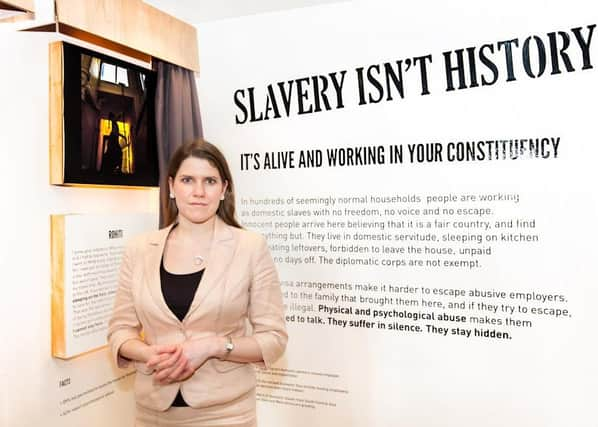Forget the Victorian statues and prevent modern slavery instead – Helen Martin


THERE are times when older people, including me, feel surprised by what younger people do, say and believe.
Sometimes that’s simply because the more aged can’t keep up with modern technology and developments. Fair enough.
Advertisement
Hide AdAdvertisement
Hide AdIt can be that we live different lives. For the retired, a career goal doesn’t count but it’s a major challenge for younger people, especially when all industries are at risk today.
We do often care and campaign for the same things. Climate change is increasingly led by younger people who are going to suffer more when their parents and grandparents have moved on to “after life” or added to litter having their ashes scattered. But parents care more about their children’s future and that of their children’s children than they care about themselves.
Climate change involves animal survival too and I don’t want younger generations living in a world without elephants, lions, rhinos, whales or any other planetary wildlife.
But sometimes, when generations don’t see things the same way, it can be because of what older folk experienced and learned many decades ago, or how their old-fashioned education covered different subjects with information that now seems to be lost.
Advertisement
Hide AdAdvertisement
Hide AdToday, racism and slavery are all-consuming topics. Modern racism, in our ‘global’ society of diversity and equality is disgraceful, revolting and ‘backward’.
Socially, it’s normal now to have mixed-race couples and their children. Our crucial roles from medical and surgical consultants to university lecturers are multi-racial. Nursing, teaching, science . . .we no longer live in a country or a world run by white men.
Yet in the US especially, we have racist police who have shocked the globe. And in the UK there still seems to be racist attitudes from thick, shameful people with a sick delusion of superiority.
Old or young, all intelligent people should be campaigning for total racial equality because colour and religion are no more significant differences than a shoe size or eye colour.
Advertisement
Hide AdAdvertisement
Hide AdBut slavery? That’s a weird association with racism. It’s true, of course, that white westerners captured black African people, chained them in ships and sold them for servitude domestically and industrially, had them held captive in grotty barracks and brutally whipped, tortured or killed.
But selling and providing slaves was a global industry. Who had serving slaves? India, Africa, Europe, Britain, the US, China, Arabia and more. Which religions were involved in selling or buying slaves?
Christians, Muslims, Jews . . .anyone with money.
We learned a lot about that in school, including the horrible aspect of it being such a standard international economic boom as tobacco, tea and other imports. Hence the statues of those who made a fortune – and used it to create churches, schools and businesses.
Hundreds of thousands of Scots were sold as slaves to Britain’s Colonial America, around 1630. So not surprisingly, Scots banned slavery in 1778, the UK in 1807, and the US in 1865.
Advertisement
Hide AdAdvertisement
Hide AdWhere is slavery still happening today? North Korea, Eritrea, Central African Republic, Afghanistan, Mauritania, Cambodia, South Sudan, Pakistan, Iran, not to mention an estimated 13,000 victims of trafficking working as slaves in the UK and probably more in the US.
Yes, it is embarrassing and shameful to see statues on pillars. But at least they are historical and dead. It’s frankly less important to pull them down than to stop slavery happening now, not just in other parts of the world but here in Britain where it’s a secret crime rather than a hideous but ‘legal’ business back in the 19th century.
Did those born in the 60s, 70s or 80s have slavery covered in their education?
Comment Guidelines
National World encourages reader discussion on our stories. User feedback, insights and back-and-forth exchanges add a rich layer of context to reporting. Please review our Community Guidelines before commenting.